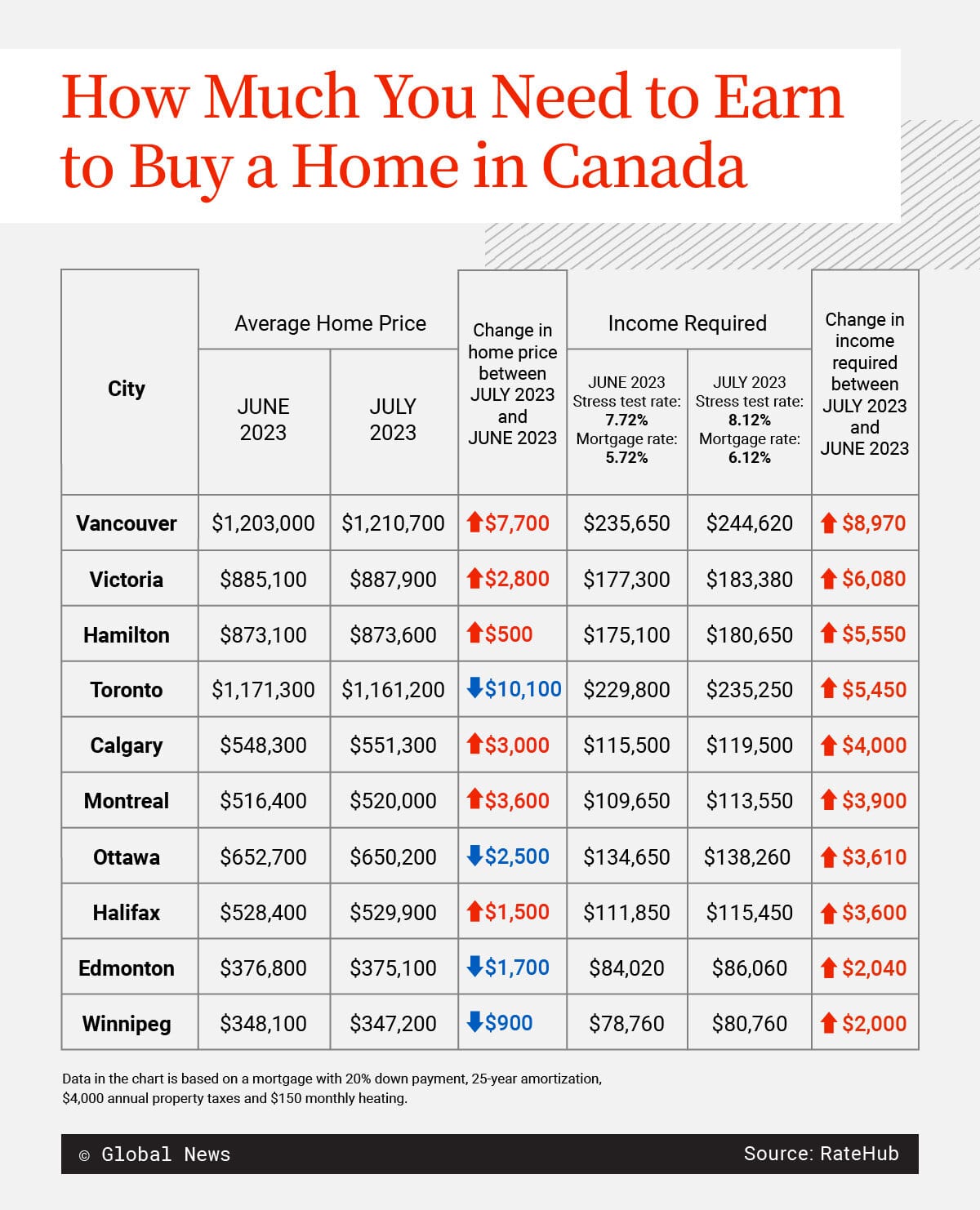Canadians looking to buy a home continue to face hurdles as costs keep piling up.

While the housing market is showing signs of stability, rising mortgage rates and still-elevated home prices mean an increase in the income needed to purchase a home, according to a new report.
The analysis by Ratehub.ca published Tuesday shows the income needed to buy an average-priced home in 10 of Canada’s major cities increased from June to July of this year.
In some of the biggest cities like Toronto and Vancouver, the average price for a home ranges from $1.16 million in the former to $1.21 in the West Coast city. And to afford such a home, the report found households in Ontario’s capital would need to earn at least $235,250, while those in Vancouver would need at least $244,620 gross.
Even in cities that saw home prices drop, such as Ottawa where an average home is about $650,200, Canadians’ needed income still rose by about $3,600 with someone having to earn $138,260 a year to buy property, according to Ratehub.
The data was based on a mortgage with a 20 per cent down payment and a 25-year amortization, with $4,000 in property taxes and $150 for monthly heating.
“Home values are sort of going sideways, but interest rates continue to rise so much that qualifying for that average home, financing that average home is becoming increasingly difficult and it is the most difficult it’s ever been,” Ratehub.ca co-CEO James Laird told Global News.
One of the big factors that stood out in the report, he said, was the mortgage stress test, which now sits at around eight per cent or higher for most Canadians.
The stress test, introduced in 2018, requires borrowers to qualify for either the minimum qualifying rate of 5.25 per cent or the contract rate plus two percentage points, whichever is higher.
This, Laird says, means whether taking a variable or fixed interest rate when trying to qualify for a home, it’s going to be more difficult, and people will need more income if they want to qualify.
The income needed to purchase a home has risen from just five months ago when Ratehub.ca released a similar report.
That report found Toronto homebuyers would need an annual income of $217,000 and $221,580 in Vancouver — meaning the income needed raised by nearly $20,000 in both cities.
The data was released just a day after Housing Minister Sean Fraser said the federal government should never have got out of the housing business, and on Wednesday told reporters there are “conversations” being had about getting the Canada Mortgage and Housing Corporation back into the affordable home-building game.
But Fraser has not provided additional detail on whether or not the feds will get involved or how they could do so going forward, though said people shouldn’t be paying more than 30 per cent of their income for a home.

“If you work in Canada, you should be able to afford a place to call home,” he said.
Laird said the best way to tackle the issue is one that has been referenced for some time as the housing crisis continues — build more homes.
“If we don’t build the homes, home values will rise even more,” he said.

He adds that while there may be concerns about people being able to afford those homes once they’re built given the income needed to do so, having more homes in supply could in turn lower the cost of some housing.
“If we overbuilt, you’d actually see our home prices come down, making them more affordable,” he said.
Aled ab Iorwerth, deputy chief economist with the CMHC, told Global News finding a solution is also going to depend on the place where people are trying to buy and as people wait in hope of eventually being able to buy, governments are going to need to build up the rental market as well.
“Buying a home for a middle-income household, even in Vancouver, in Toronto, is incredibly difficult,” he said. “That’s why we drastically need more rental market in these cities just so that people have a place to live.
“So it’s going to vary from city to city, but certainly we need a suite of policies and a lot of options to try and improve affordability.”

Some governments of different levels are exploring other options to try and help Canadians find housing, with Nova Scotia recently announcing an expansion of their agreement with home-sharing platform Happipad that matches renters with people who have empty rooms that could house a person looking for an affordable place to stay.
And though provincial Housing Minister John Lohr says it’s a small part of what they’re doing to address the housing crisis, Leah Cogan, a knowledge transfer specialist with the CMHC, said those solutions can still help in tackling issues in the housing market.

The problem Canadians still face, however, is as it may be difficult to see a jump in household income to the levels currently needed in most major cities studied, Laird says, adding that it leaves people’s budgets being pinched and putting the goal of home ownership further away.
“What it really means is that many people who are maybe planning on purchasing their first home this summer or this fall, they’re probably going to pause or they’re going to have to earn more income or they’re going to have to wait until they find a partner to purchase with,” he said.
— With files from the Canadian Press
- 3 women diagnosed with HIV after ‘vampire facials’ at unlicensed U.S. spa
- Posters promoting ‘Steal From Loblaws Day’ are circulating. How did we get here?
- As Canada’s tax deadline nears, what happens if you don’t file your return?
- N.S. mom calls for better ultrasound access after private clinic reveals twins





Comments